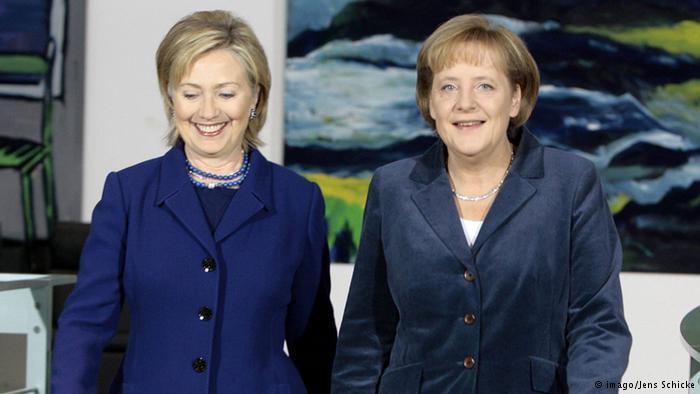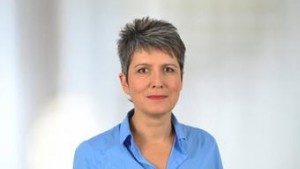Opinion: America’s fear has a new name – Angela Merkel
 Donald Trump has described Hillary Clinton as the American Angela Merkel, hoping to cast his rival in a role that feeds the deepest fears of xenophobes, writes DW’s Ines Pohl.
Donald Trump has described Hillary Clinton as the American Angela Merkel, hoping to cast his rival in a role that feeds the deepest fears of xenophobes, writes DW’s Ines Pohl.
It was Christmastime last year, and the entire world seemed to unite in expressing its esteem and regards for the German chancellor. Angela Merkel, despite her thick German accent was being celebrated on the front pages and airwaves as a voice of reason. Not only had she come to embody economic prosperity as a mother of the German nation, but she had also become a sort guarantor of safety and stability for an entire continent.
Merkel’s selfie pictures with Syrian refugees became a living symbol of this new, magnanimous Germany, not only back at home but all the way in the United States and beyond. And the crowds cheering for migrants arriving at Munich’s train station provided the perfect soundtrack to enhance this perfect image.
Merkel’s downfall
But everything changed on New Year’s Eve, once reports had emerged about the Cologne attacks. Germany’s open arms policy had suddenly turned into a menacing crisis – the refugee crisis. Increasing domestic and European problems then triggered the beginning of Merkel’s downfall, whereby her “Yes, we can” attitude shifted to a culture of fear, especially from the perspective of many American observers.
The new year also saw the onset of the race to the White House and the troubling rise of Donald Trump which gave free rein to prejudice and racism.
At last there was a politician, who would describe complex things in a way that the masses could understand; someone, who would explain how the picture-perfect American Dream could ever have turned into such a nightmare. Someone who does not beat around the bush with political correctness, and doesn’t hold back in calling a spade and spade, identifying scapegoats and offering solutions that are as simple as they are dangerous: Mexicans and Chinese are to be blamed for America’s economic woes, while Muslims are to be rounded up as the main instigators behind war and terrorism.
Wars of words on Twitter
And if there is one thing that Donald Trump excels at, it is playing with public fears and exploiting these for his own ends. That’s why it was only a question of time before he would find something to say about the change in mood in Germany and Europe in the midst of the refugee crisis, and starting using this for his campaign.
Trump publicly attacked the German Chancellor and her open-door refugee policy through crude tweets, holding her responsible for the Paris attacks. Without a hint of subtlety or restraint, Trump exploited every single assault or murder in Germany involving a Muslim using it as fodder for his policy of isolation and ostracism.
But things aren’t looking too promising for Trump anymore. He has been struggling and is constantly losing ground since the party conventions. While Clinton’s polls numbers are consistantly climbing, many prominent Republicans are turning away from Trump and his campaign team is in major disarray as well.
Trump’s entire election strategy was built from the very start on the idea of preying on insecurity – rather than on political concepts. His calculated approach is as transparent as it it is successful : the greater the public fear the more people will yearn for a strong man ready to fix things with an iron fist.
That’s why Angela Merkel’s political dilemma suits him perfectly. And once again Trump is playing the only ace he’s got up his sleeve in masterful fashion and simplicity: fear. Trump trumps his rival Hillary Clinton by declaring her America’s Angela Merkel.
A battle of the sexes
For many Americans Angela Merkel has turned into a symbol of disappointed hopes; a woman, who was widely regarded to have what it takes to master a gargantuan crisis, seemingly fails at her own inability to draw clear boundaries; a woman trusted by many people for a long time, but someone who in the end failed to show the strength required to fend off “the others” from her own country; a woman, who ultimately brought terrorism into her own country. Despite the fact that 15 years have come and gone since 9/11, Trump’s greatest political weapon remains the same: the threat of a terrorist attack.
Comparing Clinton with Merkel is such a clever ploy because equating the two women works on the face of it. It also works because it is apparent right away that Donald Trump is different. Trump fancies himself as the big, strong man, who can protect America from the mistakes of a woman.
Author: Ines Pohl
_____
WTO RECOMMENDS
Angela Merkel – Sticking to Her Stance against All Odds
Germany has been facing huge problems in regard to refugees that have been arriving in the country since last year. One might say, all this is caused by Chancellor Angela Merkel’s policy of accepting refugees and refusing to define a maximum number of refugees Germany will allow into the country. In this regard Germany stands very much alone in the European Union. (From August 17, 2016)
Angela Merkel: The most important moments of the ‘Person of the Year’
TIME has named German Chancellor Angela Merkel its ‘Person of the Year’. Merkel is the first woman named Person of the Year in three decades. The New York-based news magazine praised her leadership on a range of issues, including her handling of the refugee crisis and helping keep Greece in the Eurozone. See the report here! (From December 22, 2015)
Women in science – more complex than men think
Of the 900 Nobel Prizes since 1901, only about 50 have gone to women. This has nothing to do with women’s abilities as scientists. The problem is, there are still far too few women doing science. (From June 28, 2016)







